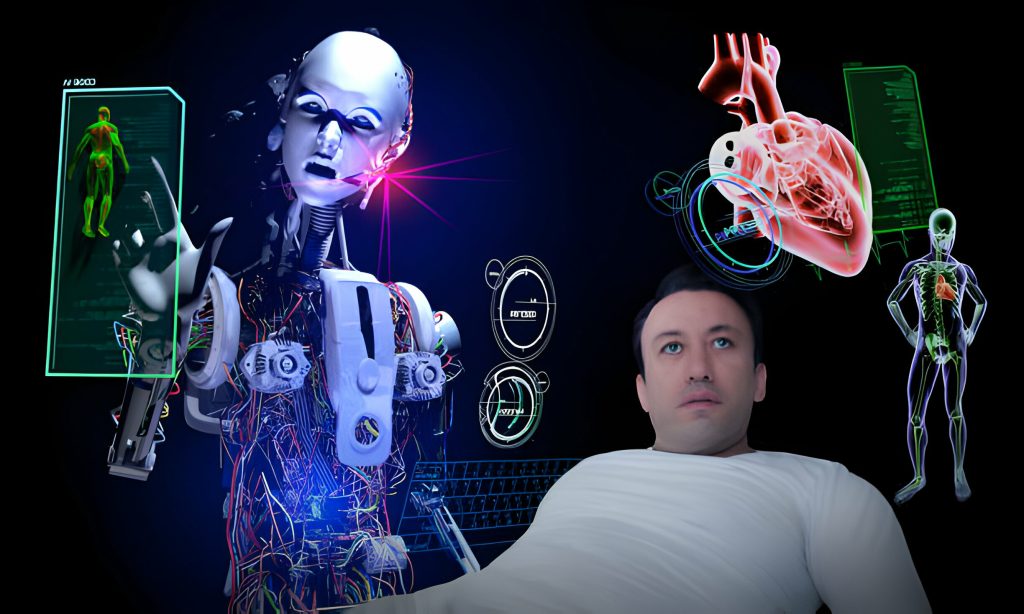With AI technology, surgeons are able to streamline procedures, anticipate complications, and receive real-time feedback. From optimizing hospital operations to enhancing diagnostic accuracy, AI is transforming healthcare administration and patient care. In this article, we will explore how AI is used in surgery, its potential to change minimally invasive procedures, and the important role surgeons play in adopting and developing this innovative technology.
AI in Healthcare Administration and Patient Care
AI can make hospital and health system operations more efficient and less costly, helping hospitals better plan their available resources, providing chatbots to answer patient questions, and enhancing surgical decision-making. Chatbot implementation is one way AI is being utilized in healthcare administration and patient care. These chatbots can assist patients by answering their questions, reducing the need for a nurse on call. AI also plays a role in bed resource optimization, allowing hospitals to better manage their beds and allocate them effectively based on patient needs. In addition, AI aids in surgical decision making by integrating information from various data sources, enabling surgeons to make more informed choices during procedures. Furthermore, AI enhances radiology image prioritization by helping radiologists identify important images and reduce evaluation time. Lastly, predictive risk assessment using AI allows for better anticipation of potential complications or risks in patients.
AI in Diagnostic Specialties
In diagnostic specialties, you can find various applications of technology such as radiology, pathology, and dermatology. AI plays a crucial role in these fields by utilizing pattern recognition and image classification algorithms. This helps improve diagnostic accuracy and efficiency, benefiting both patients and healthcare providers. AI can assist radiologists by prioritizing images and reducing evaluation time. It also has the capability to detect rare spots in medical images that may be missed by human eyes. To give you a better understanding, here is a table showcasing the key applications of AI in diagnostic specialties:
| Applications | Benefits |
|---|---|
| Pattern recognition | Improved diagnostic accuracy |
| Image classification | Efficient evaluation of medical images |
| Diagnostic accuracy | More accurate diagnosis and treatment planning |
| Radiologist assistance | Faster image prioritization and evaluation |
| Rare spot detection | Enhanced detection of small abnormalities |
With these advancements in AI technology, diagnostics specialties are experiencing significant improvements in patient care outcomes.
Predictive Analytics and Personalized Medicine
When it comes to predictive analytics and personalized medicine, you can expect advancements in assessing risks and predicting outcomes based on vast amounts of data. Here are four ways AI is revolutionizing this field:
- Risk assessment: AI algorithms can analyze patient data to identify potential risks for surgical procedures, allowing surgeons to make more informed decisions.
- Outcome prediction: By integrating diverse sources of data, AI can develop robust predictive algorithms that accurately estimate the likelihood of different treatment outcomes.
- Individualized treatment: With the help of AI, healthcare providers can tailor treatments to each patient’s unique characteristics and needs, improving overall efficacy and patient satisfaction.
- Data integration for surgical decision making: AI systems can integrate information from various sources, such as medical records and imaging data, providing surgeons with comprehensive insights during surgical decision-making processes.
The integration of predictive analytics and personalized medicine into surgical practice holds great promise for improving patient outcomes and enhancing the precision of surgical interventions.
Intraoperative Assistance and Guidance
During surgical procedures, AI-based systems can provide decision support to you as a surgeon and anticipate potential issues or abnormalities. These systems offer real-time feedback and surgical decision support, helping you make more informed choices during operations. With the use of predictive analytics, AI can analyze data from various sources to optimize your workflow and enhance patient safety. By mapping out surgical approaches and streamlining procedures, AI ensures that you have the necessary assistance and guidance throughout the entire operation. It can identify potential issues or abnormalities before they become significant problems, allowing you to take proactive measures. With AI’s ability to anticipate the next steps of an operation, it provides additional oversight and enables you to change your course of action based on anticipated events. Overall, AI in surgery is revolutionizing how surgeons like yourself perform procedures by providing valuable support and ensuring optimal outcomes for patients.
AI’s Potential to Change Minimally Invasive Surgery
With AI’s potential to comprehend surgical workflow, you can expect a transformation in the way minimally invasive procedures are performed. Here are four ways AI can change the landscape of minimally invasive surgery:
- Workflow comprehension: AI can understand and analyze the sequence of steps involved in minimally invasive surgeries, leading to more efficient and streamlined procedures.
- Surgical technique improvement: By analyzing surgical videos and providing real-time feedback, AI can help surgeons refine their techniques and achieve better outcomes.
- Real-time feedback analysis: AI can instantly analyze data from surgical instruments, patient vitals, and imaging systems to provide valuable insights during the procedure.
- Anticipation and prediction of surgical phases: With its ability to learn from vast amounts of data, AI can anticipate and predict different stages of a surgery, enabling surgeons to make informed decisions.
Overall, AI has the potential to enhance decision-making in minimally invasive surgery by providing valuable insights and improving patient outcomes.
Introduction and Overview of AI in Surgery
To understand the impact of AI on healthcare, you need a foundation of knowledge about its various subfields and how they can be integrated into modern surgical practice. AI integration in surgery has the potential to revolutionize the field by enhancing surgical decision-making, individualizing healthcare, and improving outcomes. Surgeons play a crucial role in driving AI innovation and adoption, as they are well-positioned to provide valuable input on the quality and applicability of AI advances in clinical practice. Furthermore, AI’s learning revolution can reshape how physicians learn and practice surgical skills, centralizing access for surgeons in developing regions and ensuring that more physicians have access to learning opportunities. This innovation potential can introduce new methodologies, recognize microscopic differences, optimize efficiency, improve access to surgical treatment worldwide, and transform healthcare as we know it.
Key Subfields of AI in Surgery
Now that you have an understanding of the introduction and overview of AI in surgery, let’s dive into the key subfields of AI in surgery. These subfields play a crucial role in revolutionizing surgical practices and improving patient outcomes. Here are four important applications of AI in surgery:
- Predicting complications: AI can analyze vast amounts of data to identify patterns and risk factors that may lead to postoperative complications. By predicting these complications beforehand, surgeons can take preventive measures and enhance patient safety.
- Analyzing videos: With advancements in computer vision, AI can analyze surgical videos in real-time. This allows for immediate feedback on technique, precision, and overall performance during surgeries.
- Improving outcomes: By integrating information from various data sources, AI can assist surgeons in making more informed decisions during operations. This enhances surgical techniques and ultimately improves patient outcomes.
- Enhancing monitoring: AI-based systems can provide continuous monitoring during procedures, identifying potential issues or abnormalities that may arise. This enables early intervention and ensures better patient care.
In addition to these applications, AI also plays a significant role in preoperative planning by providing surgeons with detailed insights based on individual patient characteristics and medical history.
Limitations and Risks of AI in Surgery
One concern regarding the implementation of AI in surgical practices is the potential biases in data collection, which can impact the accuracy of predictions, especially for underrepresented populations. These ethical concerns stem from the need for unbiased and representative data to ensure fair treatment and outcomes for all patients. Additionally, there are concerns regarding data privacy and the protection of patient information when using AI systems. Bias detection algorithms need to be implemented to identify and mitigate any biases present in the collected data. Transparency and interpretability of AI algorithms are also important factors that need to be addressed to gain trust from both surgeons and patients. Finally, patient acceptance of AI technology in surgery needs to be considered, as their input and comfort level are crucial for successful implementation.
Implications and Benefits of AI in Surgery
The implementation of AI in surgical practices has the potential to significantly enhance patient care and improve outcomes. Here are four key implications and benefits of AI in surgery:
- Improving outcomes: AI can assist in identifying high-risk patients, improving preoperative planning, and enhancing monitoring of complications, leading to better surgical outcomes.
- Enhanced decision making: By bringing integrated information from different data sources, AI can enhance surgical decision-making and provide surgeons with valuable insights during operations.
- Preoperative planning: AI-based systems can analyze vast amounts of patient data and generate evidence-based best practices, helping surgeons plan surgeries more effectively and minimize risks.
- Care quality improvement: With its ability to augment human performance, AI can contribute to the development of more efficient healthcare practices, leading to improved care quality for patients.
In addition to these benefits, the integration of AI in surgery also provides learning opportunities for surgeons by reshaping how they learn and practice surgical skills through AI-based systems. Overall, the use of AI in surgery holds great promise for advancing patient care and transforming healthcare practices.
Surgeons’ Role in AI Adoption and Development
Surgeons can actively contribute to the development and integration of AI into modern healthcare practices. Their involvement is crucial in various aspects, such as data collection, algorithm accountability, learning opportunities, and innovation potential. Surgeons have the opportunity to provide valuable input in assessing the quality and applicability of AI advances in the clinical sector. They play a vital role in driving AI innovation and contributing to data collection efforts. Additionally, surgeons’ understanding is critical in improving the interpretability of AI algorithms and ensuring accountability. With AI-based systems reshaping how physicians learn and practice surgical skills, surgeons can benefit from enhanced learning opportunities. Furthermore, their involvement can lead to innovative advancements that reshape surgical procedures and improve patient outcomes. Surgeons are poised to make a significant impact on the successful adoption and development of AI in surgery.
| Surgeon Involvement | Data Collection | Algorithm Accountability | Learning Opportunities |
|---|---|---|---|
| Active participation in driving AI innovation | Contributing to data collection efforts | Ensuring transparency and ethical use of algorithms | Reshaping how physicians learn surgical skills |
| Providing valuable input on applicability of AI advances | Enhancing knowledge for better decision-making | Improving interpretability for safety concerns | Utilizing AI-based surgical robotics |
| Assessing quality of AI technology | – | – | – |
Incorporating surgeons’ perspectives ensures that AI technologies are developed with a focus on improving patient care while maintaining ethical standards. Surgeons have unique insights into clinical practice that can shape the design and implementation of these technologies. By actively engaging with AI development, surgeons can help drive progress towards more efficient, accurate, and personalized surgical care.



